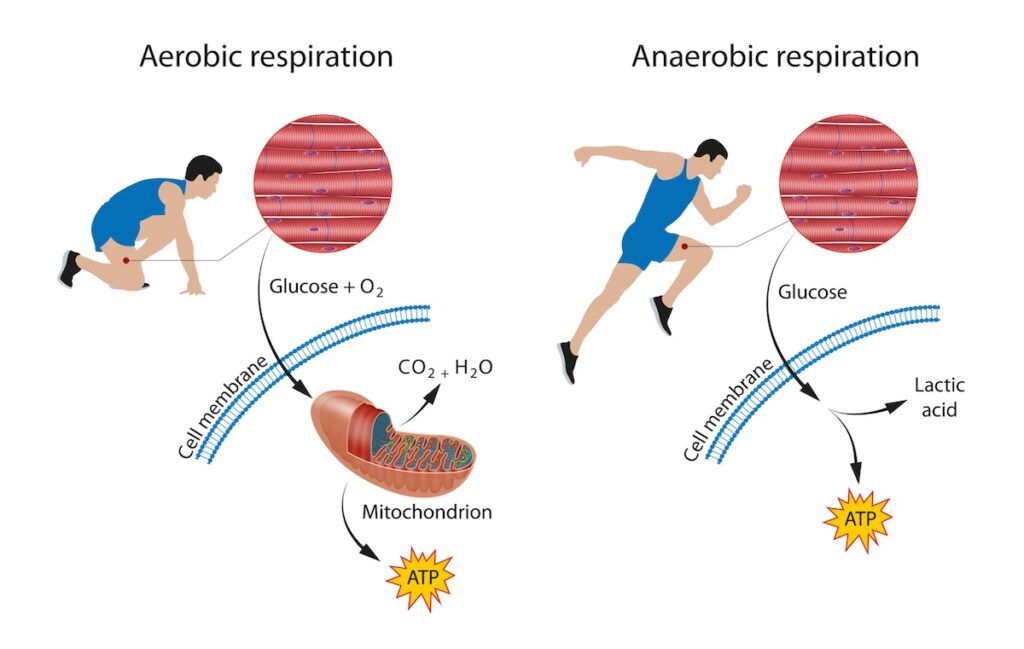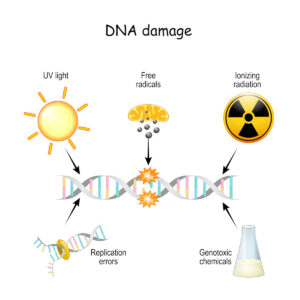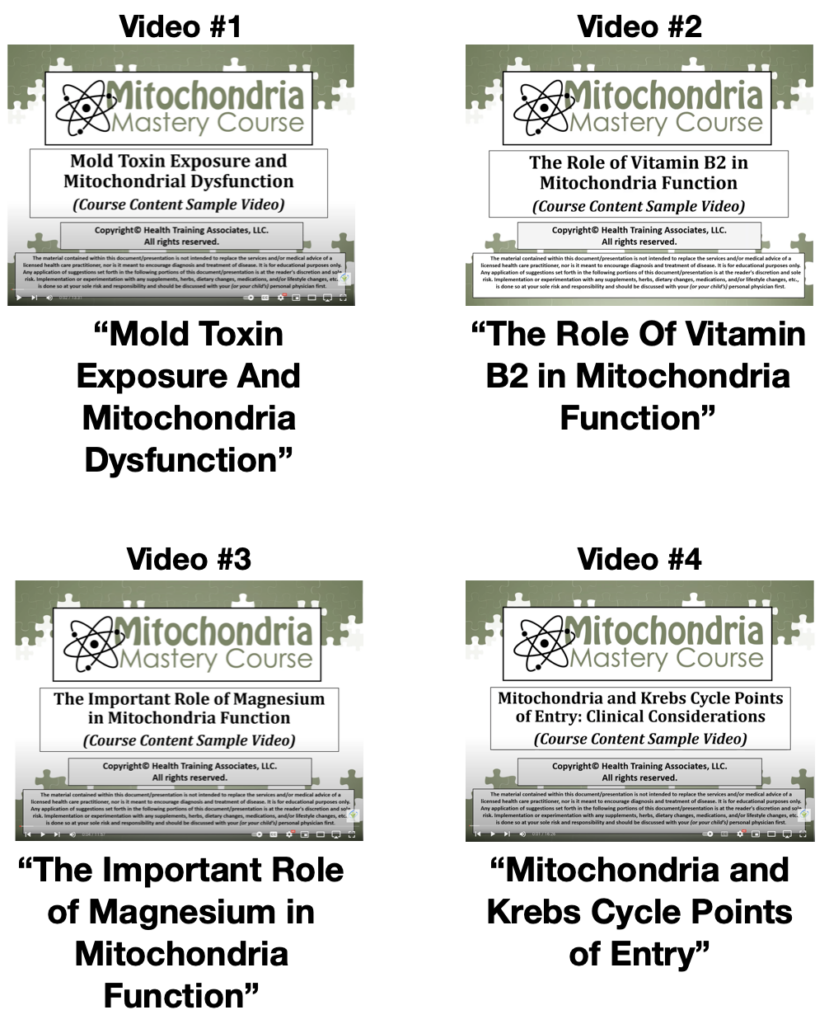
Start Today!
Learn To Assess And Treat Mitochondria Dysfunction With The Mitochondria Mastery Course
Why You Need The
Mitochondria Mastery Course:

The mitochondria are known as the energy production factories of a cell. Through their sophisticated biochemical reactions, the mitochondria produce adenosine triphosphate (ATP) as a critical chemical used throughout the cell and the entire organism for various metabolic and physiological actions.
For example, the heart needs about 700 milligrams of ATP which is needed to fuel one beat per second for ten seconds. Minimally, the heart requires approximately 6 grams of ATP every day to function normally. The heart is the most metabolically active and demanding organ in the body and each heart cell contains thousands of mitochondria.This same ATP is required elsewhere, too, in other high demand body areas such as the gastrointestinal, immune, musculoskeletal, and nervous systems.
The amount of ATP needed daily for normal function is almost incalculable. When problems occur in the mitochondria from intrinsic biochemical dysregulation or outside influences such as environmental toxins, an individual’s health is greatly compromised. Many chronic health conditions such as autism, Alzheimer’s disease, autoimmunity, cancer, cardiovascular disease, chronic fatigue, diabetes, neurological problems, etc. are now, in part, recognized to be linked to mitochondria dysfunction.
A deep understanding of the mitochondria’s normal function is critically important for any health professional, particularly those involved in functional and integrative medicine. Once this knowledge is established it becomes easier to recognize the multitude of factors that cause mitochondrial problems and then intervention and therapeutic strategies to help the situation.
This, in essence, is the focus of the Mitochondria Mastery Course.
What Are Mitochondria?
Mitochondria are a double membrane organelle found in most eukaryotic (contain a nucleus) organisms. Within the human body they are replete in high metabolic organ systems such as the heart, liver, and muscles. Through their generation of ATP, the mitochondria stand at the center of cellular metabolic activity for energy production and maintenance. However, mitochondria are vulnerable to damage from various things such as poor nutrition, oxidative stress, environmental toxins, heavy metals like lead and mercury, inflammation, and mycotoxins (mold toxins).
Does The Mitochondria Do More Than Just Produce ATP?
The mitochondria are more than just producers of ATP. In addition, these organelles function in cellular signaling, maintain and regulate cellular division and growth, and normal cell death. The ability of mitochondria to regenerate through a process called mitochondrial biogenesis or mitogenesis is an important component in mitochondria function and preservation of health. Mitochondria also are involved in calcium signaling and storage, membrane potential regulation, heme production, and steroid synthesis, immune and hormone signaling, and much more. Fundamentally and very importantly, the mitochondria are necessary for producing energy for physical movement and activity.

What Is An Example Of An Environmental Toxin Affecting Mitochondria Function?
Certain mycotoxins of mold can directly damage mitochondria. For example, Gliotoxin, linked to Aspergillus mold, directly damages mitochondria through reactive oxygen species production. A powerful mycotoxin called T-2 derived from Fusarium mold creates mitochondria membrane instability triggering apoptosis (programmed cell death) with the release of an integral inner membrane protein called Cytochome c. There are many other examples of environmental toxins and their adverse effects on mitochondrial function that are discussed in the Mitochondria Mastery Course.


What Conditions Are Linked To Mitochondria Problems?
The list of conditions is extensive, but here are some of the more common disorders and diseases known to be associated with mitochondria dysfunction:
Autoimmune Diseases Such as Multiple Sclerosis
Cancer
Chronic Fatigue Syndrome
Cardiovascular Diseases Such as Atherosclerosis &
Other Heart & Vascular Conditions
Diabetes & Metabolic Syndrome
Gastrointestinal Disorders
Neurobehavioral and psychiatric conditions like autism and depression
Neurodegenerative diseases: Alzheimer’s, Parkinson’s, Huntington’s, ALS, etc.
Diabetes & Metabolic Syndrome
Musculoskeletal Disorders
"The mitochondria are more than just the powerhouses of the cell. They are an integrated network of critical chemical reactions for overall cell function, including energy production, systems organization, and cellular regulatory activity of profound significance. In essence, they are in part the physical manifestation of the unseen life breath of the cell."
- Kurt Woeller, D.O., Health Education Director, Integrative Medicine Academy
Who Is The Mitochondria Mastery Course Designed For?
Our Mitochondria Mastery Course is designed for the health care practitioner who is looking to delve deeper into the science underlying mitochondrial activity related to health and illness. This course is designed for any type of health professional with a focus on the functional and integrative practitioner wanting to understand the mitochondria’s role in medical biochemistry and cellular metabolism. In addition, this course emphasizes clinical aspects of inducers of mitochondria dysregulation that leads to its dysfunction. This includes environmental chemical toxins, heavy metals, nutritional imbalances, mold, and mycotoxins. In addition, we cover laboratory testing, including the Organic Acids Test (OAT), mycotoxin and environmental chemical profiles, heavy metal analysis, and other lab tests useful for mitochondria assessment.
Practitioners looking to expand their knowledge related to mitochondria function and its connection to health and disease.
Practitioners who have personally used the OAT, mycotoxin profiles, heavy metal testing or other laboratory profiles that emphasize mitochondrial function or compounds known to trigger its dysfunction.
Practitioners who have taken Dr. Kurt Woeller’s one-day OAT seminar through the GPL Academy sponsored by Mosaic (formerly Great Plains)Laboratory.
Practitioners who are using other integrative medicine laboratories. No prior experience with the OAT, environmental chemical, and mycotoxin profiles are necessary or required to participate in this course.
Physicians (M.D., D.O., N.D., D.C.), naturopaths, nurses, physician assistants, acupuncturists, registered dieticians, nutritionists, health coaches, or other health professionals.
Practitioners who are Alumni of at least one of the Mastery courses offered from Integrative Medicine Academy: Autism Mastery, Candida Mastery, Essential & Advanced OAT Mastery, Functional Mastery, Hormone Mastery, SIBO Mastery, Toxicity Mastery.
Mitochondria Mastery Course Content:
Live Module Lectures –
1.5 to 2 Hours Each
4 LIVE Pre-Scheduled Q&A Sessions With Dr. Kurt Woeller
Bonus Material
Course Documents (Handouts, Articles, Resources)
Multiple Course Exams
Certificate of Completion (With Successful Passage of Course Exams at 80% or higher)
CME/CEU Credits (Category 1 credits)
Mitochondria Mastery Course Syllabus
Module
#1
Introduction to Mitochondria and Their Role in Health and Disease
This module will explore the varied aspects of mitochondrial function for health and disease.
Module
#2
Mitochondria Fundamentals: Structural Organization and Basic Function
This module will describe the important components of mitochondria structure and their individual functions.
Module
#3
Mitochondria Fundamentals: Genetics & Mitochondrial Diseases
This module explores the genetics of mitochondria and respective diseases from an integrative medicine viewpoint.
The role of genetics in mitochondria structure and function.
Conventional laboratory testing for mitochondrial genetics and function.
Module
#4
Cellular and Mitochondria Biochemistry Fundamentals - Glycolysis and Gluconeogenesis
This module goes through the key steps of glycolysis and gluconeogenesis with regards to mitochondria and cellular metabolism.
Module
#5
Cellular and Mitochondria Biochemistry Fundamentals - Krebs Cycle
This module goes through the key steps of Krebs Cycle biochemistry in relation to mitochondria activity and dysfunction.
Module
#6
Cellular and Mitochondria Biochemistry Fundamentals - The Electron Transport Chain
This module explores the intricacies of the electron transport chain, dysfunction, and points of vulnerability.
Module
#7
Environmental Inducers of Mitochondrial Dysfunction - Heavy Metals and Chemicals
This module outlines environmental chemicals and heavy metals and their influence on mitochondrial function.
Module
#8
Environmental Inducers of Mitochondrial Dysfunction - Mold and Mycotoxins
This module outlines mold and mycotoxin negative influence on mitochondrial function.
Module
#9
Diet, Nutrition, and Exercise and Their Influence on Mitochondrial Function
This module explores the importance of healthy lifestyle choices for diet, exercise, etc. on mitochondrial health.
Module
#10
Other Interventions for Improved Mitochondrial Function: Fasting, Cold Exposure, Photobiomodulation, etc.
This module outlines alternative forms of positive influences on mitochondrial function.
Module
#11
Mitochondria and the Cell Danger Response.
This module outlines mitochondria stress and the Cell Danger Response (CSR).
Module
#12
Mitochondria and Cellular Signals of Immune Activation - Homeostasis Imbalance and the Highly Sensitive Individual.
This module explores the relationship between immune function, homeostasis imbalances, and mitochondrial function.
“To fully grasp the significance of the mitochondria in health and disease, a practitioner needs to be well-versed in the structure, function, and biochemistry of its activity. Once this is achieved, in addition to understanding the various environmental factors that adversely affect the mitochondria, a functional and integrative health practitioner can then confidently and competently design helpful healing strategies for their patient and clients.”
- Kurt Woeller, D.O., Health Education Director, Integrative Medicine Academy
Meet Your Instructor:
Kurt N. Woeller, D.O.
Health Education Director,
Integrative Medicine Academy
Kurt N. Woeller, D.O., a Doctor of Osteopathic Medicine, is a functional and integrative medicine physician with over two decades of clinical experience in chronic health problems, including autism, autoimmune, gastrointestinal and neurological disorders. Through his private practice, Sunrise Functional Medicine, Dr. Woeller works with patients across the globe. He is well known for his his four-pillar approach to functional and integrative medicine, and more specifically, for successful Autism intervention.
He is The Author of Several Integrative Health Books:
• Autism – The Road To Recovery.
• Methyl-B12 For Autism.
• 7 Facts You Need To Know About Autism.
• Methyl-B12 and Methylation Therapy for Alzheimer’s Disease and Dementia.
• 5 Things You MUST Do To Treat Your Rheumatoid Arthritis (co-authored with Tracy Tranchitella, N.D.).
Dr. Woeller is an internationally recognized lecturer and educator on functional and integrative medicine having spoken throughout the North America, as well as Asia, Europe, Mexico, United Kingdom and Central America. Since 2015, Dr. Woeller has taught the one-day Organic Acids Test (OAT) seminars from Mosaic (formerly Great Plains) Laboratory.
He provides health practitioner education through Integrative Medicine Academy, an online resource for educational information on integrative medicine topics. He also runs Autism Recovery System, an online resource for parents of autism-spectrum individuals. He is the Medical Director for Lab Tests Plus, providing professional, functional medicine lab testing that is often only available through a doctor’s office, direct to the consumer. Dr. Woeller is also the host of Functional Medicine Doc Talk, a podcast focusing on health, wellness, and how to use functional and integrative medicine to optimize health, and overcome chronic illness.
Dr. Woeller serves as a clinical consultant/educator for Mosaic (formerly Great Plains) Laboratory, providing patient and physician education regarding functional and integrative medicine through one-on-one training and monthly webinars.
He has served on various scientific advisory boards, including Integrative Medicine for Mental Health (IMMH) and currently for BioBotanical Research. Dr. Woeller is a member of the American Osteopathic Association (AOA), and Medical Academy of Pediatric Special Needs (MAPS) where he holds a Fellowship.
What Some Of Our Alumni Say:
"The real bonus is the practice development aspect, the intake forms, the questionnaires, and all the handouts are so important and so useful. No other training program offers that. The other program I am enrolled in doesn’t do ANYTHING to support clinical practice development, nor does it have an online forum for us to ask questions or interact. We are getting such amazing training here, and Dr. Woeller is giving us far more than expected."

- Dr. Michael J.
"I can absolutely say that I learned more in this course than I have than in most other programs I have attended. You made it so simple to create protocols that I can implement in my office."

- Dr. Bruce F.
"These are highly professional and principled scholars who will inspire you to become the best functional medicine practitioner of which you are capable. The entire staff of Integrative Medicine Academy reflects this excellence and integrity and I am truly blessed to have learned of the Academy."

- Dr. Janiece A.
"Dr. Woeller helped to simplify the information and gave me confidence in.
I appreciate his very thorough and well outlined protocols and references for products and testing, and the handouts to use with patients. I loved being able to do the course remotely and not have to pay travel expenses. I would certainly recommend this course"

- Dr. Deborah G.
Frequently Asked Questions
Do I Need Some Other Type of Functional Medicine Training to Participate?
No. You do not need to have prior training in functional medicine prior to participate in the Mitochondria Mastery Course. You will find that this course provides a good overview of this topic.
Will There be Tests and/or Examinations Required For This Course?
Yes. This course will offer exams for those seeking a certificate of completion and/or CEU/CME credits. Anyone can participate in the course and learn the material without taking the exams, but they will not receive this certificate or CEU/CME credits without taking and passing the examinations. There are 3 exams requiring a minimum 80% cumulative score from all exams.
What Happens if I Miss or Cannot Make The Scheduled Live Webinars or Q&A Sessions?
Each webinar and Q&A session will be recorded and posted to the website shortly after concluding. You can view each session as often as you'd like.
How Can I Incorporate This Material Into My Practice?
The benefit of this course is your improved knowledge regarding functional medicine. This will immediately make it easier for you to identify those patients or clients who may benefit from this type of approach, and also allow you to assess their needs more efficiently. The course material provided will also help you streamline office systems for laboratory testing, interpretation and treatment protocols.
Do You Provide Lecture Material & Other Patient/Client Forms That Can Be Used in Practices?
Yes. Lecture slides, course material, including office form templates, program examples, etc. are offered through this course.
Act Now! Mitochondria Mastery Course
Starts April 25th, 2024!
The timer has expired!
$3,470
Mitochondria
Mastery Course
12 Live, Lesson Webinars
4 Q&A Webinars
Bonus Lectures
3 Exams
Private Forum w/Instructors
Downloadable Course Materials - Color Slide pdf’s, Supplement & Medication Protocols, Office Forms & Documents, Patient Program Examples, Clinical Intake Questionnaire, & More.
CEU/CME Category One Credits
EARLY BIRD PRICING!
Save $500!
$2,970
available until april 18th!
12 Live, Lesson Webinars
4 Q&A Webinars
Bonus Lectures
3 Exams
Private Forum w/Instructors
Downloadable Course Materials - Color Slide pdf’s, Supplement & Medication Protocols, Office Forms & Documents, Patient Program Examples, Clinical Intake Questionnaire, & More.
CEU/CME Category One Credits
Save $500 Now, With Early Bird Discount!
Hurry! Ends APRIL 18th!
100% No Hassle, Money Back Guarantee
We are so sure you will love this Integrative Medicine Academy training course, that we will give you your money back if you don’t agree it was well worth the cost. The doctors are dynamic and inspirational speakers & teachers, and are gifted with the ability to breakdown complex concepts and put them into easy-to-understand pieces. We are so confident that you will enjoy this training course, that we offer a No Hassles, No Problems, Money Back Guarantee. Basically, if you don’t like it, we don’t want your money! Enroll in the program. After the first module, if you’re not completely satisfied by what you’ve received, simply send us an email within 7 days after the delivery of Module 1, and we’ll give you a full refund on the course.
